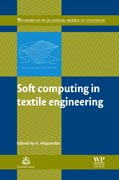
Soft computing in textile engineering: yarns, fabrics, garments and technical textile applications
Majumdar, A.
Soft computing is an emerging area of inter-disciplinary research. It refers to a collection of computational techniques which study, model and analyse complex phenomena. As many textile engineering problems are inherently complex innature, soft computing techniques have often provided optimum solutions to these cases. Although soft computing has several facets, it mainly revolves around three techniques including: artificial neural networks, fuzzy logic and genetic algorithms. The book is divided into five parts, covering the entire process of textile production, from fibre manufacture to garment engineering. These include soft computing techniques in yarn manufacture and modelling, fabric and garment manufacture, textile properties and applications and textile quality evaluation. ÍNDICE: Part 1 Introduction to soft computing: Introduction to soft computing techniques: artificial neural networks, fuzzy logic and genetic algorithm;Artificial neural networks in materials modeling; Fundamentals of soft modelsin textiles. Part 2 Soft computing in yarn manufacturing: Artificial neural network in yarn property modeling; Performance evaluation and enhancement of artificial neural network in prediction modeling; Yarn engineering using artificial neural network; Adaptive neuro-fuzzy systems in yarn modeling. Part 3 Softcomputing in fabric manufacturing: Woven fabric engineering by mathematical modeling and soft computing methods; Soft computing applications in knitting technology; Modelling nonwovens using artificial neural networks. Part 4 Soft computing for textile properties and applications: Artificial neural network modeling for prediction of thermal transmission properties of woven fabrics; Modelling the fabric tearing process; Garment modelling by fuzzy logic; Soft computing applications for sewing machines; Artificial neural network applications in textile composites. Part 5 Soft computing in textile quality evaluation: Fuzzy decision making and its applications in cotton fibre grading; Silk cocoon grading by fuzzy expert systems; Textile quality evaluation by image processing and soft computing techniques.
- ISBN: 978-1-84569-663-4
- Editorial: Woodhead
- Encuadernacion: Cartoné
- Páginas: 560
- Fecha Publicación: 01/11/2010
- Nº Volúmenes: 1
- Idioma: Inglés
